高考英语二轮复习时态讲解入门课件(共22张PPT)
文档属性
| 名称 | 高考英语二轮复习时态讲解入门课件(共22张PPT) | 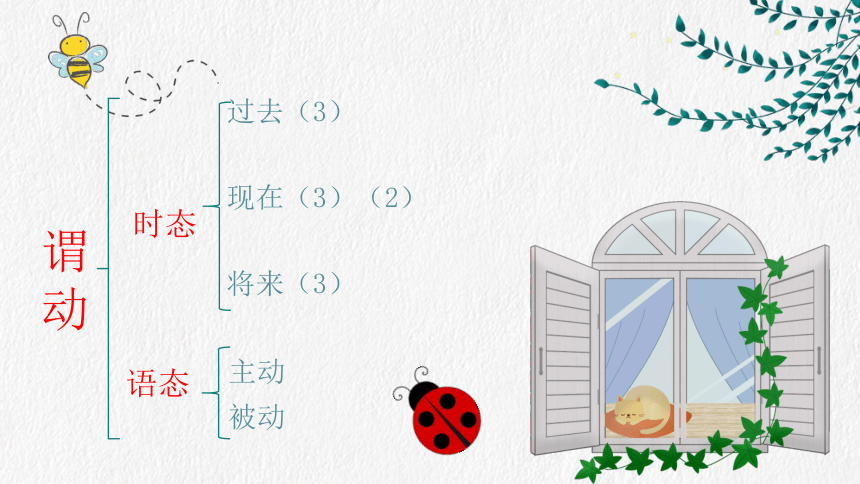 | |
| 格式 | pptx | ||
| 文件大小 | 1.8MB | ||
| 资源类型 | 教案 | ||
| 版本资源 | 通用版 | ||
| 科目 | 英语 | ||
| 更新时间 | 2022-11-28 19:40:42 | ||
图片预览


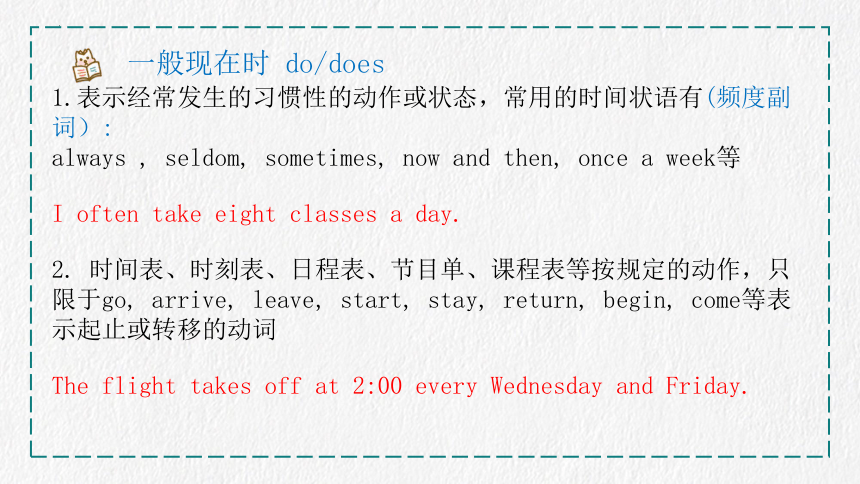
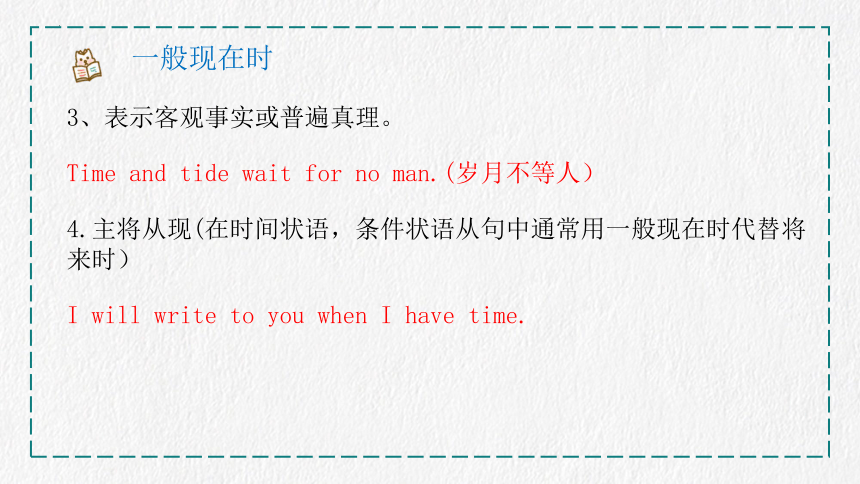
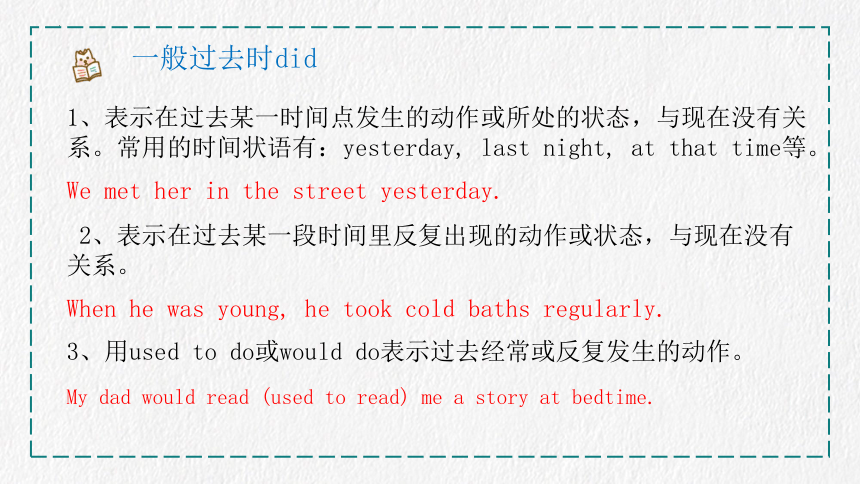
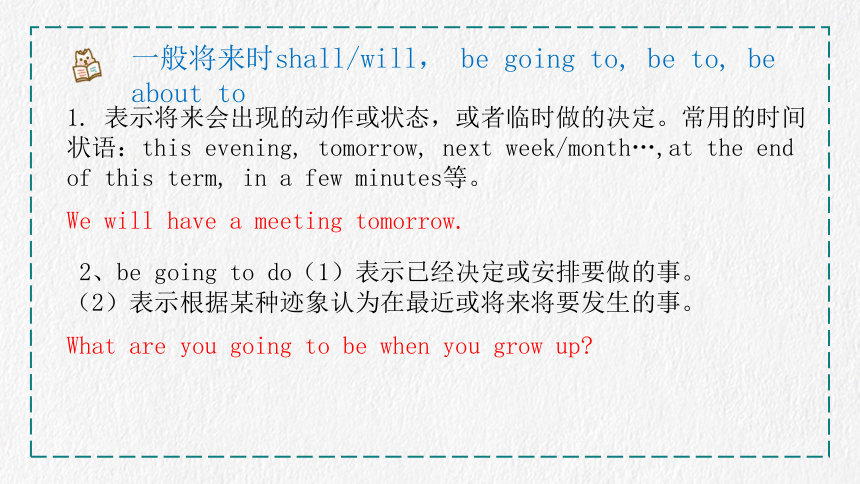
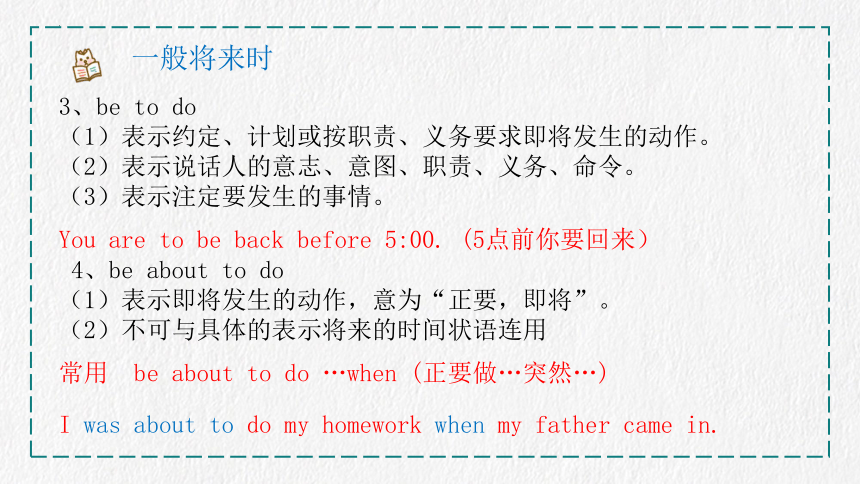
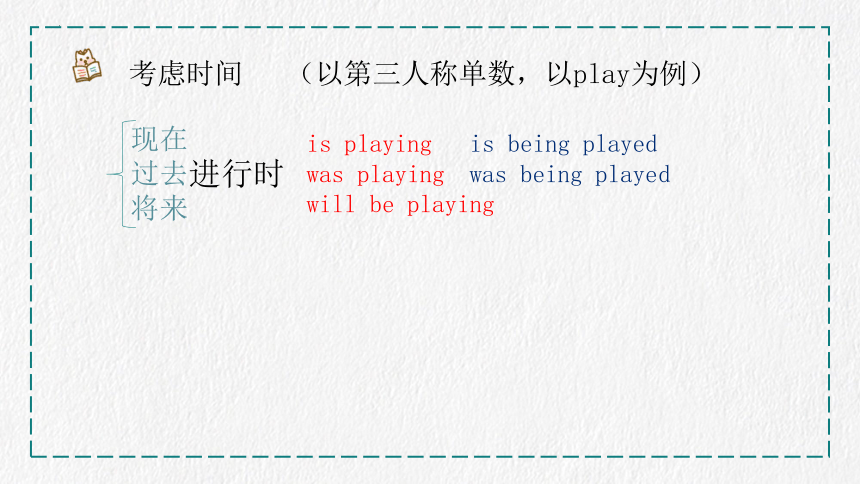

文档简介
(共22张PPT)
谓动
时态
语态
过去(3)
现在(3)(2)
将来(3)
主动
被动
考虑时间 (以第三人称单数,以play为例)
一般
现在
过去
将来
时
plays is played
played was played
will play will be played
1.表示经常发生的习惯性的动作或状态,常用的时间状语有(频度副词):
always , seldom, sometimes, now and then, once a week等
I often take eight classes a day.
2. 时间表、时刻表、日程表、节目单、课程表等按规定的动作,只限于go, arrive, leave, start, stay, return, begin, come等表示起止或转移的动词
The flight takes off at 2:00 every Wednesday and Friday.
一般现在时 do/does
3、表示客观事实或普遍真理。
Time and tide wait for no man.(岁月不等人)
4.主将从现(在时间状语,条件状语从句中通常用一般现在时代替将来时)
I will write to you when I have time.
一般现在时
1、表示在过去某一时间点发生的动作或所处的状态,与现在没有关系。常用的时间状语有:yesterday, last night, at that time等。
We met her in the street yesterday.
2、表示在过去某一段时间里反复出现的动作或状态,与现在没有关系。
When he was young, he took cold baths regularly.
3、用used to do或would do表示过去经常或反复发生的动作。
My dad would read (used to read) me a story at bedtime.
一般过去时did
1. 表示将来会出现的动作或状态,或者临时做的决定。常用的时间状语:this evening, tomorrow, next week/month…,at the end of this term, in a few minutes等。
We will have a meeting tomorrow.
2、be going to do(1)表示已经决定或安排要做的事。
(2)表示根据某种迹象认为在最近或将来将要发生的事。
What are you going to be when you grow up
一般将来时shall/will, be going to, be to, be about to
3、be to do
(1)表示约定、计划或按职责、义务要求即将发生的动作。
(2)表示说话人的意志、意图、职责、义务、命令。
(3)表示注定要发生的事情。
You are to be back before 5:00. (5点前你要回来)
4、be about to do
(1)表示即将发生的动作,意为“正要,即将”。
(2)不可与具体的表示将来的时间状语连用
常用 be about to do …when (正要做…突然…)
I was about to do my homework when my father came in.
一般将来时
考虑时间 (以第三人称单数,以play为例)
进行时
现在
过去
将来
is playing is being played
was playing was being played
will be playing
1、表示说话时正在进行或现阶段一直在进行的动作。
He is watching TV now.
I am teaching English and learning Chinese.
2、有时可表示即将发生的动作(只限于go, come, stay, leave, start, begin, arrive, return, fly, drive等表示位置移动的动词),这时常有一个表示将来时间的状语。
They are getting married next month.
现在进行时 be doing
3、常与always, forever, constantly, continually, all the time等时间副词连用,表示反复发生的或习惯性的动作,常表示不满、抱怨或赞赏等情感。
The boy is always talking loudly in class.
现在进行时
1、表示过去某一时刻或某一时间内正在进行的动作。通常有时间状语(从句)或由上下文来表示, at that time/moment, at this time yesterday(在昨天这个时候)等。
He was reading an interesting book at this time yesterday.
2、go, come, stay, leave, start, begin, arrive, return, fly, drive等表示位置移动的动词的过去进行时,表示过去将要发生的动作。
She told me that she was going to Hainan for her holiday.
过去进行时 was/were doing
1、表示在将来某一时刻或某一时间段正在进行的动作。
They will be meeting us at the station.
将来进行时 will/shall be doing
考虑时间 (以第三人称单数,以play为例)
完成时
现在
过去
将来
has played has been played
had played had been played
will have played will have been played
1、表示过去发生的某一动作对现在造成的影响或结果。常用的状语有already, yet, just等。
You have already grown much taller.
2、表示过去已经开始,持续到现在,而且还可能继续下去的动作状态。往往和表示一段时间的状语连用。
They have learned English for eight years.
3. 标志词:
for+时间段,since+时间点,already(肯,已经),yet(否,仍未),recently/lately(近来),so far/up to now/till now(到目前为止),
in/during/over the past(last) few days, by(截止)+时间
现在完成时 has/have done
4. 标志词:
for+时间段,since+时间点,
already(肯,已经),yet(否,仍未),
recently/lately(近来),so far/up to now/till now(到目前为止),
in/during/over the past (last) few days,
by(截止)+时间
5.固定句型
1.It is/has been +时间段+since从句(一般过去时)
It has been three years since the war ended.
2.This is the first time that sb have done
Is this the first time that you have visited Qingdao
现在完成时
7.注意:(1)短暂性动词在肯定句中不能与表示一段时间的时间状语连用。(2)此类动词在否定句中则可以与表示一段时间的时间状语连用。这类动词有:begin, leave, go, borrow, come, return, born, die, buy, arrive。
He has joined the army for five years. (False)
He has been in the army for five years. (True)
8、现在完成时不能和明确表示过去的时间状语连用,如:yesterday, last week, in 1988等
9.has/have been to (去过某地,现在已经回来了)
has/have gone to (去了某地,在去的路上或已经在那里)
现在完成时
现在完成时:表示某一已完成的动作对现在造成的影响或结果,强调的是现在的情况,不能喝表示过去的时间状语连用。
一般过去时:只单纯表示过去的动作或状态,和现在不发生联系。它可以和表示过去的时间状语连用。
现在完成时
1、表示在过去某一时刻以前已经完成了的动作,即“过去的过去”。
By the end of last year, we had sold 20, 000 cars.
到去年年底,我们已经卖出两万辆车了。
2.注意:在含有时间状语从句的复合句中,若两个动作紧接着发生,则不需用过去完成时,尤其是在含有before和after的复合句中,常用一般过去时代替过去完成时。
After he (had) left the room, the boss came in.
3、过去完成时用于hardly…when, no sooner…than等固定句型中(位于句首要倒装)。
Hardly had the game begun when it started raining.
过去完成时 had done
考虑时间 (以第三人称单数,以play为例)
现在
过去
has been playing 没有被动
had been playing 没有被动
1、表示开始于过去某个时间,一直持续到现在并且会继续进行下去的动作。
For days, the students have been seeking excuses for leave.
2. 表示从过去某时开始到现在一再重复的动作
I have been calling him many times this morning, but there’s no answer.
现在完成进行时 has/have been doing
一般过去时表示一个完成的动作,更加强调结果。
而过去进行时,表示过去某一阶段正在进行的动作,更加强调过程。
I was reding a novel last night.(可能没看完)
I read a novel last night.(已经看完了)
He drew a picture yesterday afternoon.(重结果,强调做了这么一件事情)
He was drawing a picture yesterday afternoon.(种过程,强调一直在画画,没做其他的事情)
谓动
时态
语态
过去(3)
现在(3)(2)
将来(3)
主动
被动
考虑时间 (以第三人称单数,以play为例)
一般
现在
过去
将来
时
plays is played
played was played
will play will be played
1.表示经常发生的习惯性的动作或状态,常用的时间状语有(频度副词):
always , seldom, sometimes, now and then, once a week等
I often take eight classes a day.
2. 时间表、时刻表、日程表、节目单、课程表等按规定的动作,只限于go, arrive, leave, start, stay, return, begin, come等表示起止或转移的动词
The flight takes off at 2:00 every Wednesday and Friday.
一般现在时 do/does
3、表示客观事实或普遍真理。
Time and tide wait for no man.(岁月不等人)
4.主将从现(在时间状语,条件状语从句中通常用一般现在时代替将来时)
I will write to you when I have time.
一般现在时
1、表示在过去某一时间点发生的动作或所处的状态,与现在没有关系。常用的时间状语有:yesterday, last night, at that time等。
We met her in the street yesterday.
2、表示在过去某一段时间里反复出现的动作或状态,与现在没有关系。
When he was young, he took cold baths regularly.
3、用used to do或would do表示过去经常或反复发生的动作。
My dad would read (used to read) me a story at bedtime.
一般过去时did
1. 表示将来会出现的动作或状态,或者临时做的决定。常用的时间状语:this evening, tomorrow, next week/month…,at the end of this term, in a few minutes等。
We will have a meeting tomorrow.
2、be going to do(1)表示已经决定或安排要做的事。
(2)表示根据某种迹象认为在最近或将来将要发生的事。
What are you going to be when you grow up
一般将来时shall/will, be going to, be to, be about to
3、be to do
(1)表示约定、计划或按职责、义务要求即将发生的动作。
(2)表示说话人的意志、意图、职责、义务、命令。
(3)表示注定要发生的事情。
You are to be back before 5:00. (5点前你要回来)
4、be about to do
(1)表示即将发生的动作,意为“正要,即将”。
(2)不可与具体的表示将来的时间状语连用
常用 be about to do …when (正要做…突然…)
I was about to do my homework when my father came in.
一般将来时
考虑时间 (以第三人称单数,以play为例)
进行时
现在
过去
将来
is playing is being played
was playing was being played
will be playing
1、表示说话时正在进行或现阶段一直在进行的动作。
He is watching TV now.
I am teaching English and learning Chinese.
2、有时可表示即将发生的动作(只限于go, come, stay, leave, start, begin, arrive, return, fly, drive等表示位置移动的动词),这时常有一个表示将来时间的状语。
They are getting married next month.
现在进行时 be doing
3、常与always, forever, constantly, continually, all the time等时间副词连用,表示反复发生的或习惯性的动作,常表示不满、抱怨或赞赏等情感。
The boy is always talking loudly in class.
现在进行时
1、表示过去某一时刻或某一时间内正在进行的动作。通常有时间状语(从句)或由上下文来表示, at that time/moment, at this time yesterday(在昨天这个时候)等。
He was reading an interesting book at this time yesterday.
2、go, come, stay, leave, start, begin, arrive, return, fly, drive等表示位置移动的动词的过去进行时,表示过去将要发生的动作。
She told me that she was going to Hainan for her holiday.
过去进行时 was/were doing
1、表示在将来某一时刻或某一时间段正在进行的动作。
They will be meeting us at the station.
将来进行时 will/shall be doing
考虑时间 (以第三人称单数,以play为例)
完成时
现在
过去
将来
has played has been played
had played had been played
will have played will have been played
1、表示过去发生的某一动作对现在造成的影响或结果。常用的状语有already, yet, just等。
You have already grown much taller.
2、表示过去已经开始,持续到现在,而且还可能继续下去的动作状态。往往和表示一段时间的状语连用。
They have learned English for eight years.
3. 标志词:
for+时间段,since+时间点,already(肯,已经),yet(否,仍未),recently/lately(近来),so far/up to now/till now(到目前为止),
in/during/over the past(last) few days, by(截止)+时间
现在完成时 has/have done
4. 标志词:
for+时间段,since+时间点,
already(肯,已经),yet(否,仍未),
recently/lately(近来),so far/up to now/till now(到目前为止),
in/during/over the past (last) few days,
by(截止)+时间
5.固定句型
1.It is/has been +时间段+since从句(一般过去时)
It has been three years since the war ended.
2.This is the first time that sb have done
Is this the first time that you have visited Qingdao
现在完成时
7.注意:(1)短暂性动词在肯定句中不能与表示一段时间的时间状语连用。(2)此类动词在否定句中则可以与表示一段时间的时间状语连用。这类动词有:begin, leave, go, borrow, come, return, born, die, buy, arrive。
He has joined the army for five years. (False)
He has been in the army for five years. (True)
8、现在完成时不能和明确表示过去的时间状语连用,如:yesterday, last week, in 1988等
9.has/have been to (去过某地,现在已经回来了)
has/have gone to (去了某地,在去的路上或已经在那里)
现在完成时
现在完成时:表示某一已完成的动作对现在造成的影响或结果,强调的是现在的情况,不能喝表示过去的时间状语连用。
一般过去时:只单纯表示过去的动作或状态,和现在不发生联系。它可以和表示过去的时间状语连用。
现在完成时
1、表示在过去某一时刻以前已经完成了的动作,即“过去的过去”。
By the end of last year, we had sold 20, 000 cars.
到去年年底,我们已经卖出两万辆车了。
2.注意:在含有时间状语从句的复合句中,若两个动作紧接着发生,则不需用过去完成时,尤其是在含有before和after的复合句中,常用一般过去时代替过去完成时。
After he (had) left the room, the boss came in.
3、过去完成时用于hardly…when, no sooner…than等固定句型中(位于句首要倒装)。
Hardly had the game begun when it started raining.
过去完成时 had done
考虑时间 (以第三人称单数,以play为例)
现在
过去
has been playing 没有被动
had been playing 没有被动
1、表示开始于过去某个时间,一直持续到现在并且会继续进行下去的动作。
For days, the students have been seeking excuses for leave.
2. 表示从过去某时开始到现在一再重复的动作
I have been calling him many times this morning, but there’s no answer.
现在完成进行时 has/have been doing
一般过去时表示一个完成的动作,更加强调结果。
而过去进行时,表示过去某一阶段正在进行的动作,更加强调过程。
I was reding a novel last night.(可能没看完)
I read a novel last night.(已经看完了)
He drew a picture yesterday afternoon.(重结果,强调做了这么一件事情)
He was drawing a picture yesterday afternoon.(种过程,强调一直在画画,没做其他的事情)
